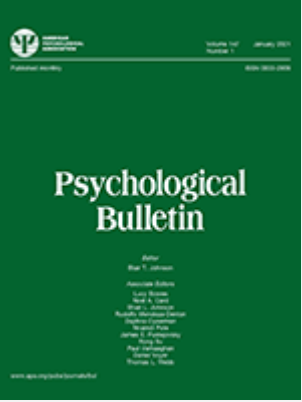内化种族主义、压力与健康:内化种族主义框架的综合元分析结构方程模型检验。
IF 19.8
1区 心理学
Q1 PSYCHOLOGY
引用次数: 0
摘要
本研究采用元分析结构方程模型来检验内化种族主义框架,该框架假设内化种族主义(IR)通过压力过程和健康损害行为与健康状况不佳直接或间接相关。我们综合了149项研究(141份报告,38,650名参与者,1982-2024)的相关效应。红外显著(p < . 05)与(a)心理压力呈正相关(k = 64, r =), (b) biophysiological压力(r = 10 k = 18日),(c)参与health-compromising行为(k = 52岁,r = 16), (d) -心理健康(k = 330, r = .23)和(e) -身体健康(r = k = 31日.09点)和显著负相关(f)积极心理健康(k = 50, r = .19)和(g)积极的身体健康(r =。08 k = 14日)。IR与(h)整体健康状况无关(k = 5, r = - 0.06)。在调整协变量(性别、年龄、种族、出版年份、同行评议状态、IR的形式和评价焦点)后,只有IR与心理压力和负性心理健康之间的关联仍然显著。IR与消极心理健康之间的关联部分可以用危害健康的行为来解释,但不能用心理压力来解释。发表偏倚的证据是混杂的,研究质量只调节了IR和积极心理健康之间的关联。研究结果支持一个扩大的内化种族主义框架,即IR-压力-脆弱性模型,该模型强调IR、压力、健康损害行为和健康之间的双向关系,对解决少数民族群体的IR具有启示意义。(PsycInfo Database Record (c) 2025 APA,版权所有)。本文章由计算机程序翻译,如有差异,请以英文原文为准。
Internalized racism, stress, and health: A comprehensive meta-analytic structural equation model test of the internalized racism framework.
We used meta-analytic structural equation modeling to test the internalized racism framework, which posits that internalized racism (IR) is associated with poor health directly and indirectly via stress processes and engagement in health-compromising behaviors. We synthesized correlation effects from 149 studies (141 reports, 38,650 participants, 1982-2024). IR was significantly (p < .05) positively associated with (a) psychological stress (k = 64, r = .18), (b) biophysiological stress (k = 18, r = .10), (c) engagement in health-compromising behaviors (k = 52, r = .16), (d) negative mental health (k = 330, r = .23), and (e) negative physical health (k = 31, r = .09) and significantly negatively associated with (f) positive mental health (k = 50, r = -.19) and (g) positive physical health (k = 14, r = -.08). IR was not associated with (h) overall health (k = 5, r = -.06). After adjusting for covariates (gender, age, ethnoracial group, publication year, peer-review status, and form and evaluative focus of IR), only the associations between IR with psychological stress and with negative mental health remained significant. The association between IR and negative mental health was partially explained by health-compromising behaviors, but not by psychological stress. There was mixed evidence of publication bias, and study quality only moderated the association between IR and positive mental health. Findings support an expanded internalized racism framework, the IR-stress-vulnerability model, which highlights bidirectional relationships among IR, stress, health-compromising behaviors, and health, with implications for addressing IR among minoritized ethnoracial groups. (PsycInfo Database Record (c) 2025 APA, all rights reserved).
求助全文
通过发布文献求助,成功后即可免费获取论文全文。
去求助
来源期刊

Psychological bulletin
医学-心理学
CiteScore
33.60
自引率
0.90%
发文量
21
期刊介绍:
Psychological Bulletin publishes syntheses of research in scientific psychology. Research syntheses seek to summarize past research by drawing overall conclusions from many separate investigations that address related or identical hypotheses.
A research synthesis typically presents the authors' assessments:
-of the state of knowledge concerning the relations of interest;
-of critical assessments of the strengths and weaknesses in past research;
-of important issues that research has left unresolved, thereby directing future research so it can yield a maximum amount of new information.
 求助内容:
求助内容: 应助结果提醒方式:
应助结果提醒方式:


